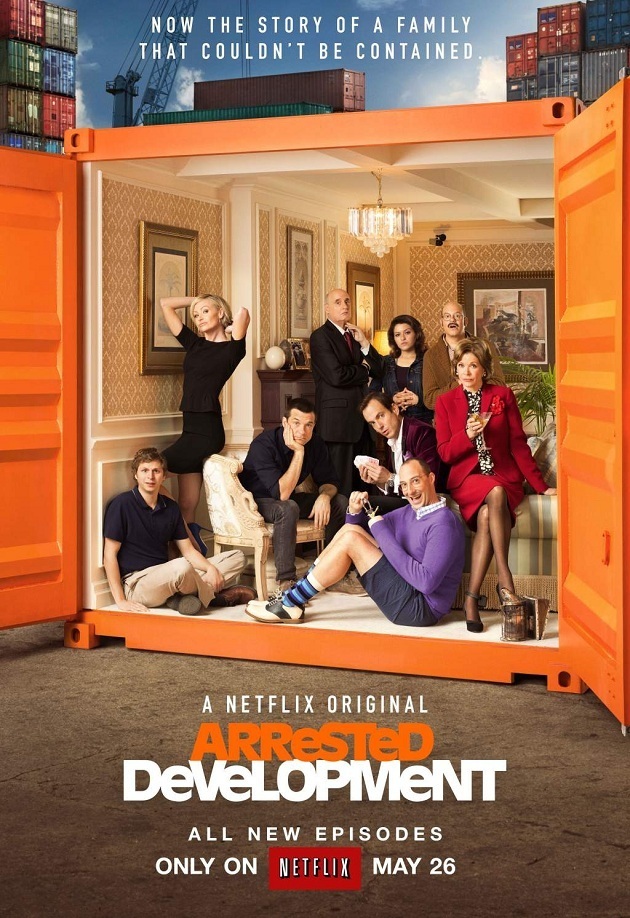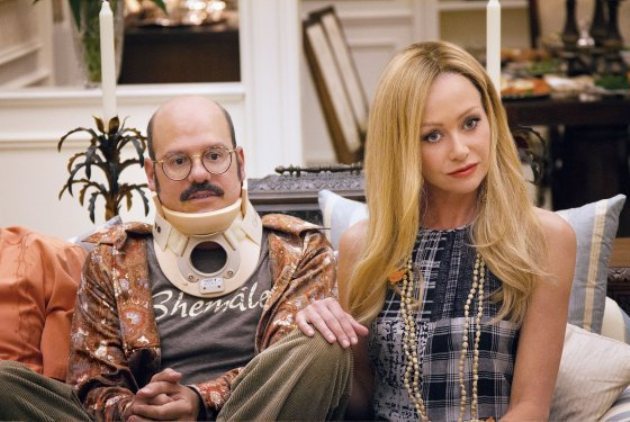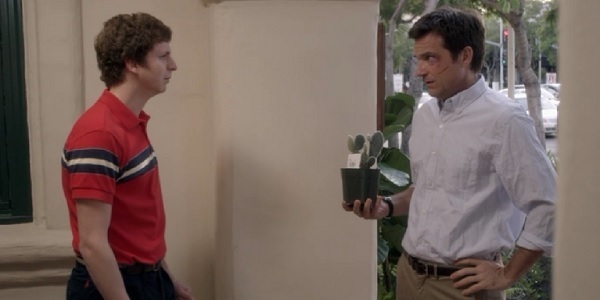'Arrested Development' season 4 review: Did it live up to the hype?
 This review contains spoilers for Arrested Development season 4.
This review contains spoilers for Arrested Development season 4.
On Sunday, the internet was treated to the long-awaited return of Arrested Development, the FOX sitcom that was canceled in 2006 and then revived this year by Netflix. That's seven long years of fans hoping and waiting for the show's return, and seven long years' worth of anticipation. Season 4 was never going to meet fans' expectations, and didn't: it was an uneven and often frustrating batch of episodes. Despite its much-touted interconnectedness, the season seemed disjointed, and there was no real arc. But despite these flaws, numerous as they were, there were some true moments of genius in Arrested Development season 4 that ultimately made it worth it.
Enough has been said about the ingenuity -- some might say novelty -- of the fourth season's weblike structure. It is a game-changer for the way we watch television, and the season certainly seems to reinforce the idea that streaming through sites like Netflix is the television of the future. But while this is all true, I'm reluctant to declare the season's structure a success. It was a decision born out of necessity (the unavailability of the cast) rather than pure creativity, and at times, it's obvious. Some episodes seem spliced together to provide the illusion of continuity, but those tricks don't always work -- it's obvious that the show used body doubles for cast members at points, for example -- and it often makes the season come across as a mosaic of disparate pieces rather than one cohesive narrative. The stories aren't so much fully meshed as they are haphazardly strung together with yarn; and while it is rewarding to go back through each episode to find all the yarn, it sometimes has as much story value as 'I Spy.'
But this structure, while necessary for practical reasons, proved detrimental to the show's characters and tone. Arrested Development always worked best as an ensemble comedy -- despite the huge amount of talent involved, the cast was more than the sum of its parts. Separating those parts -- necessity or not -- changed the dynamic of the entire series. In the first three seasons, the show's comedy came from the forced proximity of the characters -- they could be absolutely awful to one another, but then they would have to live with each other. The fun came from seeing the chaos that resulted from forcing all these childish people to live in the same house.
 There was also the fact that some characters functioned better on their own. Lucille, Gob, and Maeby easily carried their respective episodes, but others -- Lindsay and George, for instance -- simply aren't interesting or outright funny enough to carry their own outings, much less two.
There was also the fact that some characters functioned better on their own. Lucille, Gob, and Maeby easily carried their respective episodes, but others -- Lindsay and George, for instance -- simply aren't interesting or outright funny enough to carry their own outings, much less two.
And maybe that's where the season's biggest problem comes in: bloat. As delighted as we were to get fifteen episodes of the series -- up from the original order of ten -- they weren't really necessary. The quick-cutting nature of the original three seasons was abandoned in favor of letting stories play out slowly. That rarely worked -- every single episode of the season had scenes that would have been better trimmed, and I can't think of a single episode that wouldn't have been better if it's been leaned down to the 22-minute length of the first three seasons. I mean, did we seriously need all that Marky Bark story? Did George, Sr. really have two episodes worth of storyline? And, perhaps most gratingly -- did that roommate vote-out in the first episode have to be drawn out so damn long? And while there was plenty of flab, there were also plenty of missed opportunities. John Slattery was absolutely wasted as Dr. Norman, while Mary Lynn Rajskub's Heartfire was hilarious but severely underused. Season 4 had a lot guest stars, and it chose to give the most annoying new characters (Marky Bark, DeBrie) the most screentime. (Like, why couldn't Tobias have fallen love with Heartfire? That would have been a much funnier dynamic.) There was one guest star who was used perfectly, though: Kristin Wiig as young Lucille. Seth Rogen was less believable as young George (I would have rather they just kept Jeffrey Tambor in a wig), but Kristin Wiig impersonation of Jessica Walter was perfect -- and, thankfully, the show knew just how much of her was enough.
But while Arrested Development's fourth season was often frustrating in its choices, it was just as often rewarding. Jokes like "anustart" and the recurrence of "The Sound of Silence" were as funny as anything the show did in its first three seasons. And the performances were all absolutely great. Jessica Walter stole the show in her episode with the always-watchable Lucille, while Will Arnett, David Cross, Alia Shawkat, and Tony Hale all returned to their characters in prime form. Some of them were even given real character development -- Tobias became a little more self-aware, Lucille realized how she was perceived by her children, and even Buster became a little more independent (though not much).
But while there was character development, there was no clear arc. The most obvious thing to do -- and, I'll admit, what I was hoping -- would be for Arrested Development to bring the characters together in the finale, for a reconciliation and a realization that the most important thing isn't breakfast or privacy, it's family. I held out for that resolution right up until the credits on the final episode rolled -- but it didn't.
 No, it ended with a shocking punch to the face and silent stares of grief and betrayal between George Michael and his father. It was an incredibly sad moment, but not because Michael didn't deserve it -- he'd easily become the show's least likable character over the course of the season. But it was sad because with that punch came the realization that Arrested Development was about the Bluth family falling apart, not coming together. It was a depressing, almost despairing note to end on, watching the show's closest relationship violently self-destruct. But wow, what a brave way to end things.
No, it ended with a shocking punch to the face and silent stares of grief and betrayal between George Michael and his father. It was an incredibly sad moment, but not because Michael didn't deserve it -- he'd easily become the show's least likable character over the course of the season. But it was sad because with that punch came the realization that Arrested Development was about the Bluth family falling apart, not coming together. It was a depressing, almost despairing note to end on, watching the show's closest relationship violently self-destruct. But wow, what a brave way to end things.
It's an ending that makes you recontextualize the entire season. It's not a happy seven-and-a-half hours of television, despite the jokes. It's kind of a tragedy -- each member of the Bluth family self-destructs and then has no one to fall back on because they've burned their bridges with the rest of their family. It's the exact opposite of the heartwarming nostalgia you'd expect from a reunion special -- instead, it's almost a statement against the idea of viewing season 4 as a reunion or any sort of novelty. It feels like Arrested Development firmly re-establishing itself as a fixture in the television landscape, planting its feet and telling us that there's more to come, because COME ON, it can't end like that. It's this, not the innovation of its format that makes Arrested Development's fourth season an important piece of television. It's a giant hand making a middle finger to any expectations that we might have had, and daring us to want more. Despite season 4's problems, you can't help but appreciate its audacity and vision.
And you know what? I do want more. B-
- Jason Bateman
Show:
- Arrested Development
Network:
- Netflix
May 29th, 2013, 6:29 am
Images courtesy of Netflix
Next Article
James Burrows decides to stay on 'The Millers'Previous Article
'Styled to Rock' announces final mentor
Netflix To Show 13-Episode Horror Series From Eli Roth
Netfix has recently been looking to establish itself as a legitimate..
David Cross Optimistic About Arrested Development Revival
Fans of FOX's too-short sitcom Arrested Development collectively shook a..


